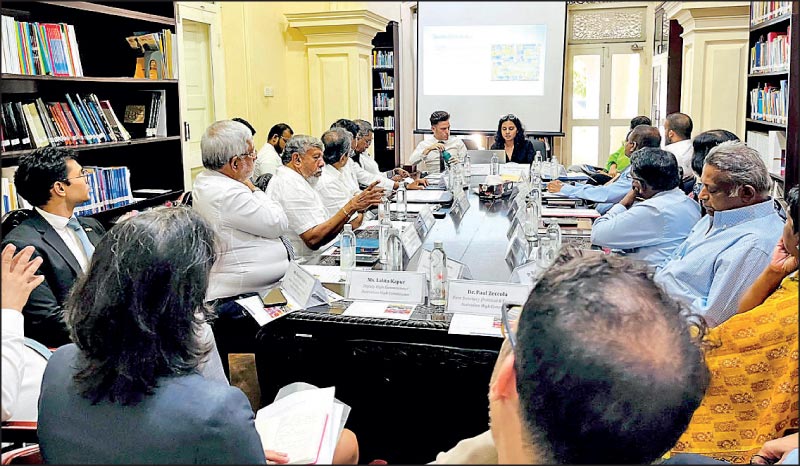Tuesday Feb 17, 2026
Tuesday Feb 17, 2026
Monday, 19 February 2024 02:23 - - {{hitsCtrl.values.hits}}

The Lakshman Kadirgamar Institute of International Relations and Strategic Studies (LKI) hosted a roundtable discussion on 1 February on the theme “Strengthening Engagement in Sri Lanka – Australia Relations”.
LKI’s roundtable series provides a platform for experts on the respective subject to engage in a candid discussion and support research output that informs policymakers and other relevant parties.
Opening the ‘round table’ held under Chatham House Rules, Ambassador Ravinatha Aryasinha emphasised that Australia was an important and influential Middle Power with whom Sri Lanka has had a longstanding relationship. He emphasised the need for Sri Lanka foreign policy to engage more with such relationships, even as it remains pre-occupied with the complexities emanating from the major power rivalries in the region.
Building on presentations by the LKI Research team comprising Ishara Tilakaratna, an undergraduate student at the University of Melbourne, Australia, who concluded a four-month internship, and Michael Iveson, Research Fellow (Global Economy), the discussion was contributed to by former Sri Lankan High Commissioners to Australia, and representatives of the Ministry of Foreign Affairs, the Australian High Commission in Colombo, Sri Lanka’s Export Development Board, Board of Investment, Port City Colombo, the Sri Lanka-Australia-New Zealand Business Council of the Ceylon Chamber of Commerce, academic, defence, sports and civil society experts.
In the discussion on the politico-strategic dimension between Australia and Sri Lanka, attention was drawn to the longstanding political relationship and the mutual support on pressing issues. Experts highlighted proactive and candid two-way communication as key to effective cooperation with Australia. Notable cooperation included Sri Lanka’s assistance to Australia in curbing human smuggling and Australia’s nuanced approach to Sri Lanka’s separatist conflict and in its aftermath. Ongoing political engagement continues to support Sri Lanka’s maritime and cyber security, with collaborative projects like the coastal forecast system funded by Australia. Sri Lanka’s role as Chair of the Indian Ocean Rim Association offers opportunities for increased engagement, particularly in hydrography and oceanography.
Stakeholders also praised Australian efforts to promote good governance and build public sector capacity in Sri Lanka through knowledge transfer and local empowerment. Experts emphasised the importance of sharing best practices in governance for structural reforms and illegal asset recovery.
The socio-cultural dimension of the relationship between Australia and Sri Lanka focussed mainly on engaging the Sri Lankan diaspora in Australia. It was noted that concerns among the diaspora include delays in dual nationality processing and transparency in financial contributions. It was noted that following the establishment of the Office of Overseas Sri Lankan Secretariat (OOSLA) in the Presidential Secretariat, concerted action was underway to address these concerns and to more pro-actively engage with the diaspora across the globe.
While Australia’s support to Sri Lanka Cricket was lauded, disappointment was expressed over not taking advantage of similar support for other sports, despite signing a Memorandum of Understanding on sports cooperation in late 2023. In the field of education, it was noted that while nearly 30 Australian affiliated institutes operated in Sri Lanka, granting University status to some who qualify to conduct full degree programs would be more cost effective for Sri Lankans and also help Sri Lanka establish itself as an educational hub in the region.
The economic dimension of the Australia-Sri Lanka relationship focussed on trade, investment, tourism, and development assistance. Sri Lanka’s exports were modest to Australia, as Sri Lanka’s export basket is matched by that of China, Indonesia and Vietnam who export to Australia with a geographical and cost advantage under free trade agreements and other institutional arrangements. Noting the historical importance of Australian investment in Sri Lanka during the 1990s, it was observed that an Australian-branded university will commence operations shortly in the Port City Colombo, which is an international multi-services Special Economic Zone (SEZ). Australia was also highlighted as a successful source of tourism to Sri Lanka, but questions were raised whether the potential of this sector has been fully exploited, given the influence the large Sri Lankan diaspora could have in encouraging Australians to travel to Sri Lanka.